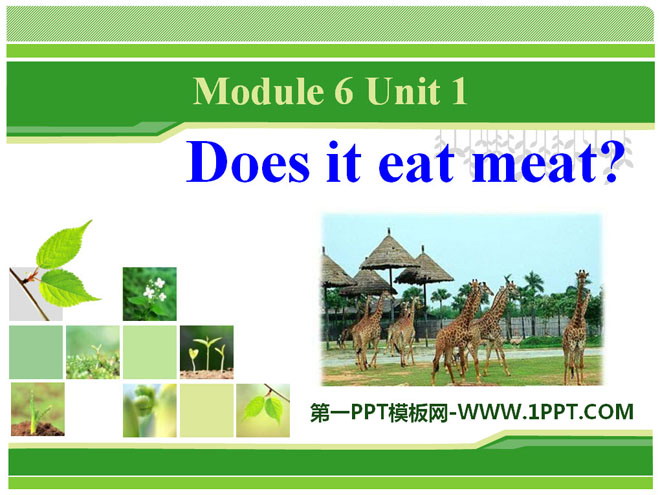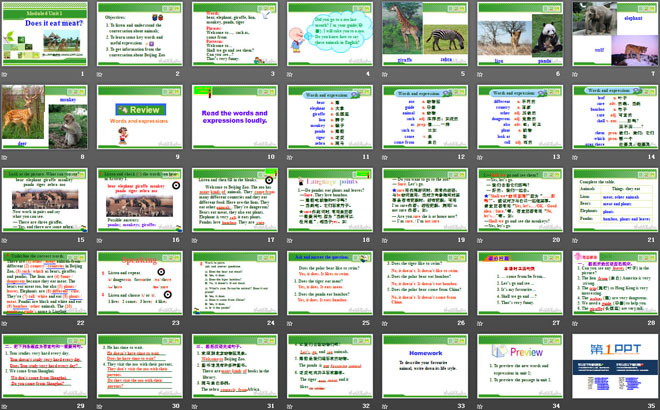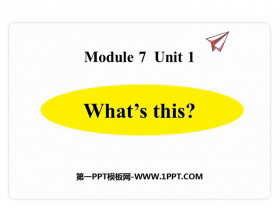

《Does it eat meat?》PPT课件
Objectives:
1. To listen and understand the conversation about animals;
2. To learn some key words and useful expressions
3. To get information from the conversation about Beijing Zoo
Words:
bear, elephant, giraffe, lion, monkey, panda, tiger
Phrases:
Welcome to…, such as,
come from
Patterns:
Welcome to…
Shall we go and see them?
Can you see...?
That’s very funny.
... ... ...
Words and expressions
bear n. 熊
elephant n. 大象
giraffe n. 长颈鹿
lion n. 狮子
monkey n. 猴子
panda n. 熊猫
tiger n. 老虎
zebra n. 斑马
... ... ...
Look at the picture. What can you see?
bear elephant giraffe monkey
panda tiger zebra zoo
Now work in pairs and say what you can see.
— There are three giraffes.
— Yes, and there are some zebra.
Listen and check (√) the words you hear in Activity 1.
bear elephant giraffe monkey
panda tiger zebra zoo
Possible answers:
pandas; monkeys; giraffes
... ... ...
Language points
1.—Do pandas eat plants and leaves?
—Sure. They love bamboo.
— 熊猫吃植物和叶子吗?
— 当然吃。它们喜欢竹子。
sure作副词时, 常用来回答一般疑问句, 意为“当然可以, 没问题”, 相当于yes。如:
— Do you want to go to the zoo?
— Sure. Let’s go.
sure用作形容词时,通常作表语,与be动词连用,当对方向你询问对某事是否有把握时,若有把握,可用I’m sure作答;若没把握,则用I’m not sure 作答。如:
— Are you sure she is at home now?
— I’m sure. / I’m not sure.
2.—Shall we go and see them?
—Yes, let’s go.
— 我们去看它们好吗?
— 好的,我们一起去。
“Shall we+动词原形?”意为“……好吗?”,建议对方与自己一起做某事。肯定回答常用“Yes, let’s…./OK. /Good idea. / Sure.”等,否定回答常用“No, let’s…”等。如:
—Shall we go and see the monkeys?
—Yes, let’s go.
... ... ...
Ask and answer the questions.
Does the polar bear like to swim?
Yes, it does. It likes to swim.
1. Does the tiger eat meat?
Yes, it does. It eats meat.
2. Does the panda eat bamboo?
Yes, it does. It eats bamboo.
3. Does the tiger like to swim?
No, it doesn’t. It doesn’t like to swim.
4. Does the polar bear eat bamboo?
No, it doesn’t. It doesn’t eat bamboo.
5. Does the polar bear come from China?
No, it doesn’t. It doesn’t come from China.
... ... ...
一、 根据所给汉语意思填空。
1. Can you see any ______ (叶子) in the picture?
2. The lion _____ (来自) America is very strong.
3. The ___ (旅行) to Hong Kong is very interesting.
4. The ______ (狼) are very dangerous.
5. We need a _____ (导游) to help you.
6. The ______ (长颈鹿) are very tall.
二、把下列各题改为否定句和一般疑问句。
1. Tom studies very hard every day.
Tom doesn’t study very hard every day.
Does Tom study very hard every day?
2. We come from Shanghai.
We don’t come from Shanghai.
Do you come from Shanghai?
3. He has time to wait.
He doesn’t have time to wait.
Does he have time to wait?
4. They visit the zoo with their parents.
They don’t visit the zoo with their parents.
Do they visit the zoo with their parents?
... ... ...
Homework
To describe your favourite animal, write down its life style.
Preview
1. To preview the new words and expressions in unit 2;
2. To preview the passage in unit 2.
关键词:《Does it eat meat?》教学课件,外研版七年级上册英语课件,七年级英语幻灯片课件下载,《Does it eat meat?》PPT课件下载,.ppt格式











